Title: March 2024
Post by: Wylie on March 01, 2024, 10:25:01 AM
Post by: Wylie on March 01, 2024, 10:25:01 AM
Here is a nice way to start the month, Ferraria crispa.
Title: Re: March 2024
Post by: Too Many Plants! on March 01, 2024, 10:38:43 AM
Post by: Too Many Plants! on March 01, 2024, 10:38:43 AM
Quote from: Wylie on March 01, 2024, 10:25:01 AMHere is a nice way to start the month, Ferraria crispa.
Love 'em!!
Title: Re: March 2024
Post by: Too Many Plants! on March 01, 2024, 10:43:28 AM
Post by: Too Many Plants! on March 01, 2024, 10:43:28 AM
One of my FAVS... Sparaxis Grandiflora sp. Violacea
IMG_2860.jpg IMG_2873.jpg
IMG_2872.jpg
IMG_2860.jpg IMG_2873.jpg
IMG_2872.jpg
Title: Re: March 2024
Post by: Martin Bohnet on March 02, 2024, 09:45:35 AM
Post by: Martin Bohnet on March 02, 2024, 09:45:35 AM
Beautiful Sparaxis - love how robust it looks!
Meanwhile spring is marching on for me - let's start with two EX-Items, as we have opened the donation phase (https://www.pacificbulbsociety.org/pbsforum/index.php?topic=821.0) this weekend. First is EX07_052, Oxalis "PomPom" from Liga Plata. Second one is EX07_176, Chasmanthe aethiopica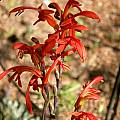 from Marian Vanneste. A small spike, but I had tried Chasmanthe before and never had it flowering at all, so maybe it's my unusually warm winter, or it is just because of the huge bulbs Marian donates.
from Marian Vanneste. A small spike, but I had tried Chasmanthe before and never had it flowering at all, so maybe it's my unusually warm winter, or it is just because of the huge bulbs Marian donates.
Not from EX, but also potted is Xenoscapa fistulosa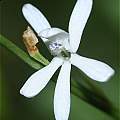 , another one from the "cute and tiny" faction. Out in the garden is a very early form of Corydalis solida
, another one from the "cute and tiny" faction. Out in the garden is a very early form of Corydalis solida , Hyacinthella lazulina
, Hyacinthella lazulina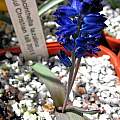 and, last but not least the gray form of Iris tuberosa in flower.
and, last but not least the gray form of Iris tuberosa in flower.
Meanwhile spring is marching on for me - let's start with two EX-Items, as we have opened the donation phase (https://www.pacificbulbsociety.org/pbsforum/index.php?topic=821.0) this weekend. First is EX07_052, Oxalis "PomPom" from Liga Plata. Second one is EX07_176, Chasmanthe aethiopica

Not from EX, but also potted is Xenoscapa fistulosa



Title: Re: March 2024
Post by: Arnold on March 03, 2024, 02:39:31 PM
Post by: Arnold on March 03, 2024, 02:39:31 PM
Gladiolus tristis
Lachenalia thomasiae I could easily be convinced it's something else.
Lachenalia thomasiae I could easily be convinced it's something else.
Title: Re: March 2024
Post by: Carlos on March 04, 2024, 11:09:51 PM
Post by: Carlos on March 04, 2024, 11:09:51 PM
The 'medium-season' strain of the quite robust, big- flowered, bulbocodium-type Narcissus with narrow and upright to arching leaves, widely distributed in Portugal, and received from Uli, has started blooming (on the right, and at the bottom). It is widely misidentified as obesus, even by Portuguese naturslists, but it is not, and one name given to it seems to be N. bulbocodium subsp. tenuifolius.
20240304_175611.jpg
20240304_175536.jpg
On the left, and at the top in the second photo, another robust bulbocodium from northern central Spain in euro-Siberian climate, growing along streams and in wwet meadows, with much wider and stouter leaves which are not so erect, and flowers more like 'normal bulbocodium'. A name which was undoubtedly published for it is Narcissus bulbocodium subsp. validus, but it lacked a Latin or English diagnose and it is not 'validus' (sorry for the joke). It might be Corbularia conspicua, but when one enters Corbularia territory gets immediately lost in a sea of obscure, short descriptions in Latin from late 17th century or the 18th, with phrases like "it comes from Spain, it comes from the Pyrenees". At least Salisbury included texts in "olde Englifh", which are fun to decipher.
So I still don't know which name is correct, but I will try.
Here the flowers, 'validus/conspicuus" on the right now, tenuifolius on the left.
20240304_175733.jpg
Hoping for some rain...
Carlos
20240304_175611.jpg
20240304_175536.jpg
On the left, and at the top in the second photo, another robust bulbocodium from northern central Spain in euro-Siberian climate, growing along streams and in wwet meadows, with much wider and stouter leaves which are not so erect, and flowers more like 'normal bulbocodium'. A name which was undoubtedly published for it is Narcissus bulbocodium subsp. validus, but it lacked a Latin or English diagnose and it is not 'validus' (sorry for the joke). It might be Corbularia conspicua, but when one enters Corbularia territory gets immediately lost in a sea of obscure, short descriptions in Latin from late 17th century or the 18th, with phrases like "it comes from Spain, it comes from the Pyrenees". At least Salisbury included texts in "olde Englifh", which are fun to decipher.
So I still don't know which name is correct, but I will try.
Here the flowers, 'validus/conspicuus" on the right now, tenuifolius on the left.
20240304_175733.jpg
Hoping for some rain...
Carlos
Title: Re: March 2024
Post by: Wylie on March 06, 2024, 08:42:32 AM
Post by: Wylie on March 06, 2024, 08:42:32 AM
It's Hippeastrum time and leading the way is Hippeastrum papilio.
Title: Re: March 2024
Post by: Too Many Plants! on March 07, 2024, 08:49:40 AM
Post by: Too Many Plants! on March 07, 2024, 08:49:40 AM
I know these are more common, but I still enjoy them in the garden...
IMG_2833.jpg IMG_2834.jpg
IMG_2836.jpg IMG_2835.jpg
IMG_2833.jpg IMG_2834.jpg
IMG_2836.jpg IMG_2835.jpg
Title: Re: March 2024
Post by: Too Many Plants! on March 07, 2024, 08:57:54 AM
Post by: Too Many Plants! on March 07, 2024, 08:57:54 AM
Ferraria Crispa (I believe), Romulaea Setifolia, and Moraea Ciliata. This is a much bigger flower display on my M. Ciliata than ever before! It's taken several years to get to this size flower display...maybe I'll actually get some seed set this year?
IMG_2871.jpg IMG_2870.jpg
IMG_2830.jpg IMG_3257.jpg
IMG_3260.jpg IMG_3256.jpg
IMG_2871.jpg IMG_2870.jpg
IMG_2830.jpg IMG_3257.jpg
IMG_3260.jpg IMG_3256.jpg
Title: Re: March 2024
Post by: Emanuele Mura on March 07, 2024, 01:49:02 PM
Post by: Emanuele Mura on March 07, 2024, 01:49:02 PM
Chasmanthe Floribunda in full flowering. Quite common around here and a bit weedy but in mass finds it's raison d'etre, doesn't it?
Title: Re: March 2024
Post by: Too Many Plants! on March 08, 2024, 10:43:22 AM
Post by: Too Many Plants! on March 08, 2024, 10:43:22 AM
More common garden bulbs...Freesia something ?
IMG_3254.jpg IMG_3253.jpg
IMG_3251.jpg IMG_3252.jpg
IMG_3304.jpg IMG_3305.jpg
IMG_3254.jpg IMG_3253.jpg
IMG_3251.jpg IMG_3252.jpg
IMG_3304.jpg IMG_3305.jpg
Title: Re: March 2024
Post by: Carlos on March 08, 2024, 11:58:26 AM
Post by: Carlos on March 08, 2024, 11:58:26 AM
Here goes another one with a tricky nomenclature, a favourite of mine. Sorry, long post.
Today's plant was placed peacefully in Scilla for almost two centuries (from 1800 to 1998).
Rafinesque, for me one of the greatest 'unfairly underrated splitters who were right', disgregated Scilla in many small to rather big genera, often because if presence / absence of bracts and/or bracteoles. He created
Tractema (https://www.google.com/url?sa=t&source=web&rct=j&opi=89978449&url=https://www.pacificbulbsociety.org/pbswiki/index.php/Tractema&ved=2ahUKEwjv6J3mr-WEAxWb8rsIHRyFALcQFnoECCAQAQ&usg=AOvVaw3lae-0LqpJvE5ff09JUF6W) in 1837. It has bracts, but no bracteoles. But the plant remained in Scilla either as a species or lumped in S. verna until Austrian prof. Speta, another underrated visionary, resuscitated Rafinesque's genera in 1998.
Ok, but Tractema verna is an Euro-Siberian plant, and the plant shown here occurs in the Mediterranean climate, from coastal areas on the Atlantic shore on sandy soils, often in Pinus pinea clear forests, with Romulea clusiana and gaditana, etc. to inland oak forests in Cádiz and Málaga provinces at 800 m or more. This plant of mine was accidentally collected in Chiclana, Cádiz, Spain by a friend when looking for Squilla (Urginea/Drimia).
20240306_181600.jpg
It was first called Scilla ramburei, which is wrong as it honours Rambur, so it should be ramburii.
A second, smaller species has perfumed flowers and was first called Scilla odorata, type locality the Algarve, at Lagos and Cape Sao Vicente, with Narcissus obesus and Hyacinthoides vicentina (mauretanica?), Portugal.
Problems:
The Portuguese botanist Rubim Almeida was the one to write the chapter on Scilla for Flora Iberica, the latest work on the flora of the Iberian peninsula and the Balearic islands.
He identified wrongly a population of Tractema verna as odorata and as he found no difference with true verna (evident) he synonymized odorata with verna (as verna subsp. verna).
In addition to this, he ignored the latest molecular evidence and did not accept Tractema as a distinct genus. This might not have been entirely his fault, as the editors have been consistently on the conservative side since the work was begun in the late eighties.
So well...
Carlos
Today's plant was placed peacefully in Scilla for almost two centuries (from 1800 to 1998).
Rafinesque, for me one of the greatest 'unfairly underrated splitters who were right', disgregated Scilla in many small to rather big genera, often because if presence / absence of bracts and/or bracteoles. He created
Tractema (https://www.google.com/url?sa=t&source=web&rct=j&opi=89978449&url=https://www.pacificbulbsociety.org/pbswiki/index.php/Tractema&ved=2ahUKEwjv6J3mr-WEAxWb8rsIHRyFALcQFnoECCAQAQ&usg=AOvVaw3lae-0LqpJvE5ff09JUF6W) in 1837. It has bracts, but no bracteoles. But the plant remained in Scilla either as a species or lumped in S. verna until Austrian prof. Speta, another underrated visionary, resuscitated Rafinesque's genera in 1998.
Ok, but Tractema verna is an Euro-Siberian plant, and the plant shown here occurs in the Mediterranean climate, from coastal areas on the Atlantic shore on sandy soils, often in Pinus pinea clear forests, with Romulea clusiana and gaditana, etc. to inland oak forests in Cádiz and Málaga provinces at 800 m or more. This plant of mine was accidentally collected in Chiclana, Cádiz, Spain by a friend when looking for Squilla (Urginea/Drimia).
20240306_181600.jpg
It was first called Scilla ramburei, which is wrong as it honours Rambur, so it should be ramburii.
A second, smaller species has perfumed flowers and was first called Scilla odorata, type locality the Algarve, at Lagos and Cape Sao Vicente, with Narcissus obesus and Hyacinthoides vicentina (mauretanica?), Portugal.
Problems:
The Portuguese botanist Rubim Almeida was the one to write the chapter on Scilla for Flora Iberica, the latest work on the flora of the Iberian peninsula and the Balearic islands.
He identified wrongly a population of Tractema verna as odorata and as he found no difference with true verna (evident) he synonymized odorata with verna (as verna subsp. verna).
In addition to this, he ignored the latest molecular evidence and did not accept Tractema as a distinct genus. This might not have been entirely his fault, as the editors have been consistently on the conservative side since the work was begun in the late eighties.
So well...
Carlos
Title: Re: March 2024
Post by: Uli on March 08, 2024, 01:16:16 PM
Post by: Uli on March 08, 2024, 01:16:16 PM
Had a little walk today during cool and rainy weather in the Barrocal. Which is the low land between the coast or littoral and the serra, the mountain range in the hinterland of the Algarve. Barrocal soil in general is terra rossa, the bedrock is limestone. Rich native flora. I was searching for Peonia broteroi and found it, but still in bud. It is a rare plant. On the way I came across many Orchis italica. IMG_3383.jpgIMG_3382.jpgIMG_3381.jpg
Title: Re: March 2024
Post by: Too Many Plants! on March 08, 2024, 01:34:15 PM
Post by: Too Many Plants! on March 08, 2024, 01:34:15 PM
Quote from: Carlos on March 08, 2024, 11:58:26 AMHere goes another one with a tricky nomenclature, a favourite of mine. Sorry, long post.
Today's plant was placed peacefully in Scilla for almost two centuries (from 1800 to 1998).
Rafinesque, for me one of the greatest 'unfairly underrated splitters who were right', disgregated Scilla in many small to rather big genera, often because if presence / absence of bracts and/or bracteoles. He created
Tractema (https://www.google.com/url?sa=t&source=web&rct=j&opi=89978449&url=https://www.pacificbulbsociety.org/pbswiki/index.php/Tractema&ved=2ahUKEwjv6J3mr-WEAxWb8rsIHRyFALcQFnoECCAQAQ&usg=AOvVaw3lae-0LqpJvE5ff09JUF6W) in 1837. It has bracts, but no bracteoles. But the plant remained in Scilla either as a species or lumped in S. verna until Austrian prof. Speta, another underrated visionary, resuscitated Rafinesque's genera in 1998.
Ok, but Tractema verna is an Euro-Siberian plant, and the plant shown here occurs in the Mediterranean climate, in coastal areas on the Atlantic shore on sandy soils, often in Pinus pinea clear forests, with Romulea clusiana and gaditana, etc. It has perfumed flowers and was first called Scilla odorata, type locality the Algarve, at Lagos and Cape Sao Vicente, with Narcissus obesus and Hyacinthoides vicentina (mauretanica?), Portugal. This plant of mine was accidentally collected in Chiclana, Cádiz, Spain by a friend when looking for Squilla (Urginea/Drimia).
20240306_181600.jpg
The second plant was first called Scilla ramburei, which is wrong as it honours Rambur, so it should be ramburii. It grows inland on 'normal soils' up to 800 m and probably more. Type locality: Antequera, Málaga province.
Problems: they were both lumped under Scilla verna as subspecies, and in Flora Iberica they have been swapped, so 'ramburii' is applied to the coastal plant on sandy soils, and 'odorata' for the inland plant. But I looked the original descriptions and types up and there is no doubt. Portugal 1, Spain 0, this time. I was told by a Portuguese biologist.
Carlos
Beautiful!
Title: Re: March 2024
Post by: Too Many Plants! on March 08, 2024, 07:52:22 PM
Post by: Too Many Plants! on March 08, 2024, 07:52:22 PM
Sparaxis Tri-color waking up...
IMG_3296.jpg IMG_3298.jpg
IMG_3299.jpg IMG_3306.jpgI
IMG_3380.jpg IMG_3381.jpg
IMG_3440.jpg
IMG_3296.jpg IMG_3298.jpg
IMG_3299.jpg IMG_3306.jpgI
IMG_3380.jpg IMG_3381.jpg
IMG_3440.jpg
Title: Re: March 2024
Post by: Too Many Plants! on March 09, 2024, 11:55:30 AM
Post by: Too Many Plants! on March 09, 2024, 11:55:30 AM
Another really nice Sparaxis (imho), S. Elegans starting its show.
IMG_3314.jpg
IMG_3314.jpg
Title: Re: March 2024
Post by: Too Many Plants! on March 10, 2024, 06:59:09 PM
Post by: Too Many Plants! on March 10, 2024, 06:59:09 PM
Sparaxis Tri Color pink / white. I enjoy them a lot amongst my many S. Tri-color sp. flower colors.
Seed collected specifically from this plant and a couple other very similar looking flower plants should be in the upcoming SX offering. Now be warned, I have a lot of Sparaxis, including non Tri-color sp., so it's entirely possible there could be some crosses in that seed. But they should make for fantastic late winter early spring flowers no matter the purity outcome!
IMG_3330.jpg IMG_3332.jpg
IMG_3331.jpg
Seed collected specifically from this plant and a couple other very similar looking flower plants should be in the upcoming SX offering. Now be warned, I have a lot of Sparaxis, including non Tri-color sp., so it's entirely possible there could be some crosses in that seed. But they should make for fantastic late winter early spring flowers no matter the purity outcome!
IMG_3330.jpg IMG_3332.jpg
IMG_3331.jpg
Title: Re: March 2024
Post by: Martin Bohnet on March 11, 2024, 12:33:38 AM
Post by: Martin Bohnet on March 11, 2024, 12:33:38 AM
As donations are a bit slow this year, I'll tease with another two EX items: Lachenalia "Aqua Lady" (EX04_040 from @AngelikaN ) and Trimezia species (EX04_60) from Uli.
Meanwhile in the garden, the plants slowly get higher: Iris aucheri Olof in front of Fritillaria sewerzowii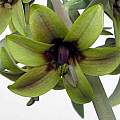 (which in turn is planted too close to Scilla peruviana). Sidenote to myself: Have to improve the code on the link-plugin for subpages that do not contain the genus name (here: Juno vs. Iris)
(which in turn is planted too close to Scilla peruviana). Sidenote to myself: Have to improve the code on the link-plugin for subpages that do not contain the genus name (here: Juno vs. Iris)
Meanwhile in the garden, the plants slowly get higher: Iris aucheri Olof in front of Fritillaria sewerzowii

Title: Re: March 2024
Post by: Too Many Plants! on March 11, 2024, 12:15:48 PM
Post by: Too Many Plants! on March 11, 2024, 12:15:48 PM
Quote from: Martin Bohnet on March 11, 2024, 12:33:38 AMAs donations are a bit slow this year, I'll tease with another two EX items: Lachenalia "Aqua Lady" (EX04_040 from @AngelikaN ) and Trimezia species (EX04_60) from Uli.
DANG!...wish I could get in on the EU seed EX for that Lachenalia Aqua Lady!!
Title: Re: March 2024
Post by: Carlos on March 13, 2024, 08:14:21 AM
Post by: Carlos on March 13, 2024, 08:14:21 AM
Albuca 'spiralis' ex Château Pérouse, from EX02 I think. It obviously is not spiralis...
20240312_161451.jpg20240312_161435.jpg20240312_161531.jpg
20240312_161603.jpg
And Narcissus obesus, also from CH-P, again it is not the right thing, it is the 'false Portuguese obesus'..
20240312_161827.jpg
20240312_161801.jpg20240312_161835.jpg
Oncostema peruviana 'ifniensis' preparing to bloom
20240312_162049.jpg
And a wild Iris pseudacorus seen today. I had never taken a photo of it...
20240313_113751.jpg
Carlos
20240312_161451.jpg20240312_161435.jpg20240312_161531.jpg
20240312_161603.jpg
And Narcissus obesus, also from CH-P, again it is not the right thing, it is the 'false Portuguese obesus'..
20240312_161827.jpg
20240312_161801.jpg20240312_161835.jpg
Oncostema peruviana 'ifniensis' preparing to bloom
20240312_162049.jpg
And a wild Iris pseudacorus seen today. I had never taken a photo of it...
20240313_113751.jpg
Carlos
Title: Re: March 2024
Post by: Uli on March 13, 2024, 02:14:09 PM
Post by: Uli on March 13, 2024, 02:14:09 PM
The spiraling of Albuca spiralis leaves very much depends on the growing conditions, the harder, dryer and sunnier it grows the more the leaves curl up. But it may in fact be something else.
A question: how does Oncostemma peruviana ifnensis differ from other forms? Which color is the flower?
A question: how does Oncostemma peruviana ifnensis differ from other forms? Which color is the flower?
Title: Re: March 2024
Post by: Uli on March 13, 2024, 02:18:58 PM
Post by: Uli on March 13, 2024, 02:18:58 PM
Moraea sisyrinchium is a common and beautiful wild flower in the Algarve and can flower en masse. Interestingly the flowers only open in the afternoon and are invisible before.
Title: Re: March 2024
Post by: Carlos on March 13, 2024, 02:55:35 PM
Post by: Carlos on March 13, 2024, 02:55:35 PM
Hi, Uli. I don't know and I don't know (or remember). I just bought it from rareplants before Brexit, I am focused on other things. But I wouldn't be surprised if there were no substantial differences.I know very little about Albucas, but I think the brown-red bracts, greenish pendant flowers, and scabrid/hairy straight leaves are a strange combination.I wonder if anyone else took the seeds, I did not write down the reference and though I keep all 'invoices', I could not find this one.
The Narcissus was EX03_238, so I keep thinking that the Albuca is earlier.
Carlos
Title: Re: March 2024
Post by: Martin Bohnet on March 14, 2024, 12:16:32 AM
Post by: Martin Bohnet on March 14, 2024, 12:16:32 AM
My (sadly deceased last fall) "Albuca spiralis" looked flower&spike wise very similar, but was somewhat spiralled even in my dark falls - see here https://www.flickr.com/photos/150325868@N06/23716684398/in/album-72157677456980444/ . Hard to believe that a spiralis in Spain would be so straight.
on the other hand, that hardcore curling and compact growth of that "fizzle sizzle" cultivar seen advertised was like a very different plant. a tetraploid, maybe?
on the other hand, that hardcore curling and compact growth of that "fizzle sizzle" cultivar seen advertised was like a very different plant. a tetraploid, maybe?
Title: Re: March 2024
Post by: CG100 on March 14, 2024, 02:14:34 AM
Post by: CG100 on March 14, 2024, 02:14:34 AM
Quote from: Uli on March 13, 2024, 02:14:09 PMThe spiraling of Albuca spiralis leaves very much depends on the growing conditions,
And clone, but there is usually some spiralling. With so many broadly similar albuca species, it would take a novice with the genus, most of a lifetime to determine if that is A. s. or not.
Commercial nursery A. s. will almost certainly be grown either geographically far enough south to maximise curl and minimise costs, or grown further north under lights that maximise curl.
Title: Re: March 2024
Post by: Steve Willson on March 14, 2024, 11:11:43 AM
Post by: Steve Willson on March 14, 2024, 11:11:43 AM
Flowering now, from Rimmer deVries' seeds donated to BX454 (spring 2019) - Clivia Sahin Yellow. Of the five seeds I received, three have made it thus far. This is the first to flower.
Title: Re: March 2024
Post by: Too Many Plants! on March 14, 2024, 04:42:55 PM
Post by: Too Many Plants! on March 14, 2024, 04:42:55 PM
Quote from: Arnold on March 03, 2024, 02:39:31 PMGladiolus tristis
Hi Arnold. It's interesting how different my G. Tristis looks compared to yours...
IMG_2890.jpg IMG_2924.jpg
Title: Re: March 2024
Post by: Arnold on March 14, 2024, 07:08:51 PM
Post by: Arnold on March 14, 2024, 07:08:51 PM
I think mine may be a bit of a hybrid. It seeds all over the greenhouse bench and I have 4-5 pots with it growing.
Title: Re: March 2024
Post by: Too Many Plants! on March 15, 2024, 09:25:40 AM
Post by: Too Many Plants! on March 15, 2024, 09:25:40 AM
Quote from: Arnold on March 14, 2024, 07:08:51 PMI think mine may be a bit of a hybrid. It seeds all over the greenhouse bench and I have 4-5 pots with it growing.
Mine is also quite productive spreading it's likeness around my garden. Now I try to pull all the seed pods off before they have a chance to ripen and open.
Title: Re: March 2024
Post by: Robin Jangle on March 15, 2024, 11:49:18 PM
Post by: Robin Jangle on March 15, 2024, 11:49:18 PM
That's Albuca viscosa. Albuca spiralis leaves, although also glandular hairy are nowhere near as hairy as A. viscosa. Albuca spiralis leaves are dark green not olive green and the fool proof way of separating the two is that A. spiralis leaves clasp at the base whereas A. viscosa do not.
Albuca viscosa often has leaves spiral in the upper third but most commonly not. I have them growing wild across the road from me and none have spiral leaves yet where I lived before (about 50km north) they were all spiral.
Albuca viscosa often has leaves spiral in the upper third but most commonly not. I have them growing wild across the road from me and none have spiral leaves yet where I lived before (about 50km north) they were all spiral.
Title: Re: March 2024
Post by: Too Many Plants! on March 17, 2024, 03:49:37 PM
Post by: Too Many Plants! on March 17, 2024, 03:49:37 PM
Another exciting first flowering of some of my most recent bounty from our last BX. Again I'd like to say a Big Thank you to those generous folks that spread the bulb Love!
Moraea Aristata
IMG_3668.jpg IMG_3670.jpg
IMG_3667.jpg IMG_3669.jpg
Moraea Aristata
IMG_3668.jpg IMG_3670.jpg
IMG_3667.jpg IMG_3669.jpg
Title: Re: March 2024
Post by: Uli on March 17, 2024, 04:35:08 PM
Post by: Uli on March 17, 2024, 04:35:08 PM
Is it really four-petalled?
Title: Re: March 2024
Post by: Too Many Plants! on March 17, 2024, 07:08:34 PM
Post by: Too Many Plants! on March 17, 2024, 07:08:34 PM
Quote from: Uli on March 17, 2024, 04:35:08 PMIs it really four-petalled?
I didn't even question that, but it sure appears so...
Title: Re: March 2024
Post by: Wylie on March 19, 2024, 08:44:52 AM
Post by: Wylie on March 19, 2024, 08:44:52 AM
Homeria flaccida
Title: Re: March 2024
Post by: Carlos on March 19, 2024, 11:44:21 PM
Post by: Carlos on March 19, 2024, 11:44:21 PM
Hi, Robin, many thanks!
Some wild daffodils in NE Andalusia
Narcissus coronatus (= pallidulus)
20240317_173811.jpg
20240317_173716.jpg
20240317_173644.jpg
Narcissus longispathus
20240317_144338.jpg
20240317_144441.jpg
20240317_144753.jpg
20240317_144010.jpg
20240317_143859.jpg
Narcissus hedraeanthus
20240317_142528.jpg
20240317_141524.jpg
Some wild daffodils in NE Andalusia
Narcissus coronatus (= pallidulus)
20240317_173811.jpg
20240317_173716.jpg
20240317_173644.jpg
Narcissus longispathus
20240317_144338.jpg
20240317_144441.jpg
20240317_144753.jpg
20240317_144010.jpg
20240317_143859.jpg
Narcissus hedraeanthus
20240317_142528.jpg
20240317_141524.jpg
Title: Re: March 2024
Post by: Carlos on March 19, 2024, 11:50:06 PM
Post by: Carlos on March 19, 2024, 11:50:06 PM
More N. hedraeanthus
20240317_161131.jpg
20240317_141229.jpg
20240317_141345.jpg
And a tiny endemic, Tractema (Scilla) paui
20240317_165545.jpg
20240317_164639.jpg
20240317_164629.jpg
20240317_164458.jpg
20240317_164246.jpg
20240317_161131.jpg
20240317_141229.jpg
20240317_141345.jpg
And a tiny endemic, Tractema (Scilla) paui
20240317_165545.jpg
20240317_164639.jpg
20240317_164629.jpg
20240317_164458.jpg
20240317_164246.jpg
Title: Re: March 2024
Post by: Too Many Plants! on March 20, 2024, 08:58:47 PM
Post by: Too Many Plants! on March 20, 2024, 08:58:47 PM
Somewhere along the way I lost the ID tag on this Ferraria. If memory serves me, it looks different this season, it doesn't have that typical Ferraria form which I believe it usually has, but it's a different color of a unique locale.
IMG_3757.jpg IMG_3759.jpg
IMG_3760.jpg
IMG_3757.jpg IMG_3759.jpg
IMG_3760.jpg
Title: Re: March 2024
Post by: Robin Jangle on March 20, 2024, 10:25:43 PM
Post by: Robin Jangle on March 20, 2024, 10:25:43 PM
A bit strange looking (tepals quite narrow) but nonetheless Ferraria densepunctulata.
Title: Re: March 2024
Post by: Arnold on March 21, 2024, 11:14:28 AM
Post by: Arnold on March 21, 2024, 11:14:28 AM
Lachenalia liliiflora
Moraea polyanthos
Moraea polyanthos
Title: Re: March 2024
Post by: Too Many Plants! on March 22, 2024, 11:45:52 AM
Post by: Too Many Plants! on March 22, 2024, 11:45:52 AM
Another of my Favorites...such rich vivid display in the garden!
Babiana Rubrocyanea
IMG_3837.jpg IMG_3836.jpg
IMG_3833.jpg
Babiana Rubrocyanea
IMG_3837.jpg IMG_3836.jpg
IMG_3833.jpg
Title: Re: March 2024
Post by: Too Many Plants! on March 22, 2024, 11:49:41 AM
Post by: Too Many Plants! on March 22, 2024, 11:49:41 AM
I have several different color variations of Ferraria Crispa.
IMG_3838.jpg IMG_3840.jpg
IMG_3839.jpg
IMG_3838.jpg IMG_3840.jpg
IMG_3839.jpg
Title: Re: March 2024
Post by: Carlos on March 22, 2024, 12:31:13 PM
Post by: Carlos on March 22, 2024, 12:31:13 PM
The Oncostema peruviana 'ifniensis' is already in bloom
20240322_165322.jpg
And Moraea mediterranea
20240322_164523.jpg
20240322_165322.jpg
And Moraea mediterranea
20240322_164523.jpg
Title: Re: March 2024
Post by: Too Many Plants! on March 22, 2024, 02:13:28 PM
Post by: Too Many Plants! on March 22, 2024, 02:13:28 PM
Quote from: Robin Jangle on March 20, 2024, 10:25:43 PMA bit strange looking (tepals quite narrow) but nonetheless Ferraria densepunctulata.Thanks Robin. Maybe this will help confirm. I went back through previous years pics, and know by location of my garden...here's the flowers looking as they typically do. I wonder, we've been getting more rain and with more frequency this late winter/early spring than we have in most of the last 10 years at least. Could that contribute to the flowers looking odd this year??? On that note, many of my bulb flowers are off this year, smaller than normal, and in a couple cases much smaller than normal. For a while I thought that might be an indicator of cooler temps this time of year than typical. But I don't think that's really the case, I think the main difference is the rain. My Moraea Polystachya finished earlier than normal this year, which I've been told here in California they're sensitive to the amount of winter rain we get.
IMG_3727.jpg IMG_3726.jpg
IMG_3724.jpg
Title: Re: March 2024
Post by: Too Many Plants! on March 22, 2024, 04:59:59 PM
Post by: Too Many Plants! on March 22, 2024, 04:59:59 PM
Quote from: Uli on March 17, 2024, 04:35:08 PMIs it really four-petalled?
Well Uli, I guess now I see why you asked...
the second M. Aristata flower appeared today.
IMG_3850.jpg IMG_3852.jpg
IMG_3849.jpg IMG_3851.jpg
Title: Re: March 2024
Post by: Judy Glattstein on March 22, 2024, 05:21:23 PM
Post by: Judy Glattstein on March 22, 2024, 05:21:23 PM
With the weather flip-flopping from pleasantly mild before the calendar flipped over to spring on March 19, and now back to winter-y chill (I've again been making fires in the wood burning stove) I wanted to post a picture of Bulbocodium vernum that's nicely flowering in my garden. But I keep getting an error message so you'll just have to take my word for it.
Title: Re: March 2024
Post by: David Pilling on March 22, 2024, 06:50:09 PM
Post by: David Pilling on March 22, 2024, 06:50:09 PM
Hi @Judy - what was the error message?
Title: Re: March 2024
Post by: Judy Glattstein on March 22, 2024, 08:02:45 PM
Post by: Judy Glattstein on March 22, 2024, 08:02:45 PM
I don't exactly remember so will try to send Bulbocodium vernum image again and see what happens. Image is 396 X 391 121KB Here goes . . .
Yes. Error is as follows
The message has the following error or errors that must be corrected before continuing:
The message exceeds the maximum allowed length (65000 characters).
Have deleted image. Will try to post text / no image
Title: Re: March 2024
Post by: David Pilling on March 22, 2024, 08:20:04 PM
Post by: David Pilling on March 22, 2024, 08:20:04 PM
Hi @Judy Glattstein - are you attaching the image or inserting it in the text (bad likely to give a text too long error) - you need to use the "click or drag files here to attach them" area at the bottom of the 'reply' box.
Title: Re: March 2024
Post by: Judy Glattstein on March 23, 2024, 08:02:23 AM
Post by: Judy Glattstein on March 23, 2024, 08:02:23 AM
My bad. I shall try again, as suggested
Aha! That worked. Thank you David.
Aha! That worked. Thank you David.
Title: Re: March 2024
Post by: Arnold on March 24, 2024, 02:55:46 PM
Post by: Arnold on March 24, 2024, 02:55:46 PM
Lachenalia liliiflora a bit further along and a close-up.
Title: Re: March 2024
Post by: Carlos on March 26, 2024, 12:34:05 AM
Post by: Carlos on March 26, 2024, 12:34:05 AM
Asphodelus ayardii. I finally found a good stand only a 10 min drive and 10 min walk from home, and we got rain, so they will set good seed.
Also fistulosus and cerasiferus in the area, they don't seem to hybridize. The flowers of ayardii stay open a little longer than those of fistulosus, it was about 17:20 and all fistulosus were closed.
20240324_172441.jpg20240324_172453.jpg
Also fistulosus and cerasiferus in the area, they don't seem to hybridize. The flowers of ayardii stay open a little longer than those of fistulosus, it was about 17:20 and all fistulosus were closed.
20240324_172441.jpg20240324_172453.jpg
Title: Re: March 2024
Post by: Too Many Plants! on March 26, 2024, 11:09:48 AM
Post by: Too Many Plants! on March 26, 2024, 11:09:48 AM
I have this unusual Sparaxis Tricolor orange flower plant that looks like the flowers were blushed with metallic silver.
IMG_3905.jpg IMG_3903.jpg
IMG_3904.jpg
IMG_3905.jpg IMG_3903.jpg
IMG_3904.jpg
Title: Re: March 2024
Post by: Too Many Plants! on March 26, 2024, 11:13:10 AM
Post by: Too Many Plants! on March 26, 2024, 11:13:10 AM
Another couple different S. Tricolor colors have popped up. I really enjoy my Sparaxis!
IMG_3907.jpg IMG_3909.jpg
IMG_3908.jpg IMG_3910.jpg
IMG_3907.jpg IMG_3909.jpg
IMG_3908.jpg IMG_3910.jpg
Title: Re: March 2024
Post by: Carlos on March 26, 2024, 01:09:47 PM
Post by: Carlos on March 26, 2024, 01:09:47 PM
Narcissus bulbocodium subsp quintanilhae, A lot was written on it by Dr. Abílio Fernandes, but I still don't understand what it is.
20240326_165345.jpg
20240326_165345.jpg
Title: Re: March 2024
Post by: Too Many Plants! on March 26, 2024, 01:39:39 PM
Post by: Too Many Plants! on March 26, 2024, 01:39:39 PM
Another different color variant of my Ferraria Crispas.
IMG_3927.jpg IMG_3928.jpg
IMG_3927.jpg IMG_3928.jpg
Title: Re: March 2024
Post by: Robin Jangle on March 27, 2024, 12:00:08 AM
Post by: Robin Jangle on March 27, 2024, 12:00:08 AM
@Too Many Plants! The Sparaxis are all hybrids the first set are tricolor X pillansii with tricolor dominant. The second is the same hybrid but with pillansii dominant. The third is tricolor X elegans with tricolor dominant.
The Ferraria is most likely F. foliosa.
The Ferraria is most likely F. foliosa.
Title: Re: March 2024
Post by: Too Many Plants! on March 28, 2024, 10:50:59 AM
Post by: Too Many Plants! on March 28, 2024, 10:50:59 AM
Quote from: Robin Jangle on March 27, 2024, 12:00:08 AM@Too Many Plants! The Sparaxis are all hybrids the first set are tricolor X pillansii with tricolor dominant. The second is the same hybrid but with pillansii dominant. The third is tricolor X elegans with tricolor dominant.
The Ferraria is most likely F. foliosa.
Wow! Cool. Thank you Robin. Stoked about my hybrid Sparaxis Tricolor bulbs. Most of them came from a long established garden in SoCal. Probably at least 15+ years of flowering in that garden before I got them.
Title: Re: March 2024
Post by: Too Many Plants! on March 28, 2024, 10:52:49 AM
Post by: Too Many Plants! on March 28, 2024, 10:52:49 AM
Here's another March flower'er...(lost my tag) :(
IMG_3972.jpg IMG_3973.jpg
IMG_3971.jpg
IMG_3972.jpg IMG_3973.jpg
IMG_3971.jpg
Title: Re: March 2024
Post by: Too Many Plants! on March 28, 2024, 10:56:17 AM
Post by: Too Many Plants! on March 28, 2024, 10:56:17 AM
Here's an Albuca just starting...I'll have to find the species on it (I know I've got it somewhere).
* Albuca Acuminata
IMG_3974.jpg IMG_3975.jpg
* Albuca Acuminata
IMG_3974.jpg IMG_3975.jpg
Title: Re: March 2024
Post by: Carlos on March 28, 2024, 12:50:43 PM
Post by: Carlos on March 28, 2024, 12:50:43 PM
Quote from: Too Many Plants! on March 28, 2024, 10:52:49 AMHere's another March flower'er...(lost my tag) :(HI, it is Oncostema (was Scilla) peruviana, not from Peru but from the Western Mediterraneand and adjacent Atlantic coast.
IMG_3972.jpg IMG_3973.jpg
IMG_3971.jpg
Title: Re: March 2024
Post by: Martin Bohnet on March 28, 2024, 03:27:22 PM
Post by: Martin Bohnet on March 28, 2024, 03:27:22 PM
I am so tired about this Scilla discussion. Kew's PoWo (https://powo.science.kew.org/taxon/urn:lsid:ipni.org:names:24583-1) and Inaturalist (https://www.inaturalist.org/taxon_changes/80015) conserve Scilla peruviana. Besides my usual complaint (there's a valid double m Oncostemma in Asclepioideae) i'm just done with authors finding the needed number of peer reviewers in their faction to overwrite this or that, being far from any system wide consent. For now, Kew's the authority most people accept. and they're keeping Scilla peruviana as of now.
But there are lighter topics. Light sky blue like Corydalis fumariifolia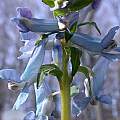 which hasn't been as impressed by early warm temperatures as many other species. It's not tuberous cousin Corydalis heterocarpa was first a bit shy in the garden, now it seeds around a lot (ants, as always with corydalis), finding places more suitable then where I planted it first.
which hasn't been as impressed by early warm temperatures as many other species. It's not tuberous cousin Corydalis heterocarpa was first a bit shy in the garden, now it seeds around a lot (ants, as always with corydalis), finding places more suitable then where I planted it first.
Third one is Fritillaria reuteri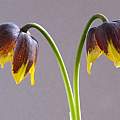 , shining bright in the sun. Another sun lover, though in a container is Anacamptis papilionacea
, shining bright in the sun. Another sun lover, though in a container is Anacamptis papilionacea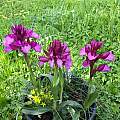
, subspecies messenica if my records are right. Next one is the opposite of a sun lover: Asarum caudatum hides in the shadows, despite being a flower giant compared to my local Asarum europaeum
hides in the shadows, despite being a flower giant compared to my local Asarum europaeum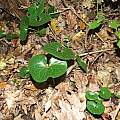 .
.
Speaking about hiding: last one is my resurfaced Iris bucharica - years ago, the clump was suffocated by my huge tree peonie. I transplanted, but there seemed to be no survivors - until this one opened up a few days ago.
But there are lighter topics. Light sky blue like Corydalis fumariifolia

Third one is Fritillaria reuteri


| Height: | 30-45 cm (1-1.5 ft) |
| Flower Colors: | pink, purple |
| Flower Season: | mid spring |


Speaking about hiding: last one is my resurfaced Iris bucharica - years ago, the clump was suffocated by my huge tree peonie. I transplanted, but there seemed to be no survivors - until this one opened up a few days ago.
Title: Re: March 2024
Post by: Too Many Plants! on March 28, 2024, 07:14:23 PM
Post by: Too Many Plants! on March 28, 2024, 07:14:23 PM
Here's one of my nicer red Sparaxis Tricolor.
IMG_3980.jpg IMG_3978.jpg
IMG_3980.jpg IMG_3978.jpg
Title: Re: March 2024
Post by: Too Many Plants! on March 28, 2024, 08:00:08 PM
Post by: Too Many Plants! on March 28, 2024, 08:00:08 PM
And my Ferraria Crispa ssp. Nortieri ⭐️🐠 flowers starting to go off 💥...with a little yellow friend hanging out with them.
IMG_3991.jpg IMG_3984.jpg
IMG_3989.jpg IMG_3985.jpg
IMG_3988.jpg IMG_3987.jpg
IMG_3990.jpg
IMG_3991.jpg IMG_3984.jpg
IMG_3989.jpg IMG_3985.jpg
IMG_3988.jpg IMG_3987.jpg
IMG_3990.jpg
Title: Re: March 2024
Post by: Wylie on March 29, 2024, 03:37:05 AM
Post by: Wylie on March 29, 2024, 03:37:05 AM
Babianas do very well in the Azores. I had bought a pack of bulbs years ago, so I don't know which ones these are. They have been allowed to mix, drop seed, and grow.
One of the first Moraea bulbs I got was Moraea ochroleuca. They settle into the ground very well.
There is also the white version of Scilla peruviana.
One of the first Moraea bulbs I got was Moraea ochroleuca. They settle into the ground very well.
There is also the white version of Scilla peruviana.
Title: Re: March 2024
Post by: Diane Whitehead on March 29, 2024, 05:48:13 PM
Post by: Diane Whitehead on March 29, 2024, 05:48:13 PM
This is the third year that Leucocoryne macropetala has flowered.
I bought seeds from John Watson and Anita Flores in 2003.
I sent some of the seeds to Sheila Burrow in Perth, Australia.
I wonder if hers have flowered.
I bought seeds from John Watson and Anita Flores in 2003.
I sent some of the seeds to Sheila Burrow in Perth, Australia.
I wonder if hers have flowered.
Title: Re: March 2024
Post by: David Pilling on March 30, 2024, 04:53:08 AM
Post by: David Pilling on March 30, 2024, 04:53:08 AM
@Diane Whitehead
There is a copyright Sheila Burrow photo of this species:
https://www.pinterest.com/pin/146789269088182672/
that I found on Google.
There is a copyright Sheila Burrow photo of this species:
https://www.pinterest.com/pin/146789269088182672/
that I found on Google.
Title: Re: March 2024
Post by: Diane Whitehead on March 30, 2024, 07:40:52 AM
Post by: Diane Whitehead on March 30, 2024, 07:40:52 AM
Same genus, but a different species
Sheila also put her photo on our wiki.
The other 6 species of Leucocoryne I bought from F & W have not bloomed yet - lots of leaves, though.
Sheila also put her photo on our wiki.
The other 6 species of Leucocoryne I bought from F & W have not bloomed yet - lots of leaves, though.
Title: Re: March 2024
Post by: David Pilling on March 30, 2024, 08:23:44 AM
Post by: David Pilling on March 30, 2024, 08:23:44 AM
Quote from: Diane Whitehead on March 30, 2024, 07:40:52 AMSame genus, but a different species
Bah! Google!
Title: Re: March 2024
Post by: Too Many Plants! on March 30, 2024, 12:37:55 PM
Post by: Too Many Plants! on March 30, 2024, 12:37:55 PM
To close out March...here's a pic from a few days ago. I missed the full flowering (if it did), I think this guy was affected by the unusual amount and frequency of rain we've been getting this season.
G. Radians.
This plant has taken many years in the ground from a planted bulb to develop into much to see.
G. Radians.
This plant has taken many years in the ground from a planted bulb to develop into much to see.
Title: Re: March 2024
Post by: Carlos on March 30, 2024, 03:42:32 PM
Post by: Carlos on March 30, 2024, 03:42:32 PM
Muscari atlanticum, Eastern Spain. POWO accepts it!
20240330_154010.jpg20240330_175404.jpg20240330_175616.jpg
20240330_175640.jpg20240330_182835.jpg20240330_182904.jpg
20240330_154010.jpg20240330_175404.jpg20240330_175616.jpg
20240330_175640.jpg20240330_182835.jpg20240330_182904.jpg
Title: Re: March 2024
Post by: Rdevries on March 31, 2024, 01:53:58 PM
Post by: Rdevries on March 31, 2024, 01:53:58 PM
Cyrtanthus falcatus x Cyrt. herrei
A bulb i received from Roy Herald in 2018 he grew from seed Ken Blackford donated in BX239.
Is it a cross?
https://www.pacificbulbsociety.org/pbswiki/index.php/CyrtanthusSpeciesTwo#falcatus
Tends to grow in warm weather A d can have the strange colored flowers and typical crooks neck.
https://www.pacificbulbsociety.org/pbswiki/index.php/CyrtanthusSpeciesTwo#herrei
Tends to grow in cool weather.
When it was smaller it remained evergreen bit this winter it went dormant a d now a flower!
A bulb i received from Roy Herald in 2018 he grew from seed Ken Blackford donated in BX239.
Is it a cross?
https://www.pacificbulbsociety.org/pbswiki/index.php/CyrtanthusSpeciesTwo#falcatus
Tends to grow in warm weather A d can have the strange colored flowers and typical crooks neck.
https://www.pacificbulbsociety.org/pbswiki/index.php/CyrtanthusSpeciesTwo#herrei
Tends to grow in cool weather.
When it was smaller it remained evergreen bit this winter it went dormant a d now a flower!
Title: Re: March 2024
Post by: Carlos on April 01, 2024, 11:45:39 AM
Post by: Carlos on April 01, 2024, 11:45:39 AM
Some 'cormous' or 'pseudobulbous' plants seen in the wild yesterday
Biarum dispar
20240331_190649.jpg
Himantoglossum robertianum
20240331_190156.jpg
Orchis olbiensis (mascula subsp. olbiensis for some)
20240331_190127.jpg
And March is over.
Biarum dispar
20240331_190649.jpg
Himantoglossum robertianum
20240331_190156.jpg
Orchis olbiensis (mascula subsp. olbiensis for some)
20240331_190127.jpg
And March is over.
Title: Re: March 2024
Post by: Arnold on April 02, 2024, 06:53:24 AM
Post by: Arnold on April 02, 2024, 06:53:24 AM
Leucocoryne sp.
Ledebouria galpinii
Ledebouria galpinii